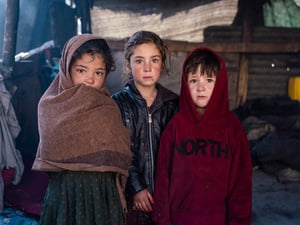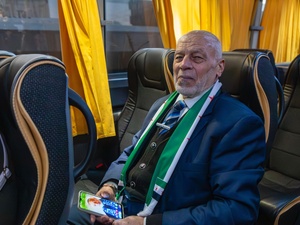Iraqi refugees contribute to success of Oscar-winning film, "The Hurt Locker"
Iraqi refugees contribute to success of Oscar-winning film, "The Hurt Locker"

On location in Jordan with 'The Hurt Locker'. An actor playing an US soldier is caught on camera.
AMMAN, Jordan, April 1 (UNHCR) - Nader and Ala'* were delighted when "The Hurt Locker" won this year's Oscars for Best Picture and Best Director. Not only did the film about a gung-ho bomb disposal expert help refocus flagging international attention on the suffering in their native Iraq, but they also had a personal role in its making.
The two were among some 20 Iraqi refugees hired to work as extras in the movie, which Kathryn Bigelow shot largely in Jordan because Iraq remains too dangerous seven years after the overthrow of the late President Saddam Hussain. Nader and Ala' fled to Amman from Baghdad in 2004 and 2005 respectively after being persecuted for their religious beliefs.
They spent almost three weeks working in various locations with Bigelow and her crew, earning the equivalent of about US$20 a day. Jordan's Royal Film Commission, a valuable partner of UNHCR, helped facilitate the making of the film, which follows a United States Army Explosives Ordnance Disposal unit as they deal with the daily threat of terrorism that Nader and Ala' once lived with.
"I am happy that the film won a prize," said Nader, who had a tiny bit of dialogue that made it into the finished work. Both he and Ala' praised the actors, director and producers for its success - "The Hurt Locker" won six Oscars and many other prestigious international prizes.
Both Nader and Ala' said it was important for them to take part in the film, because it depicted the danger that civilians and soldiers face from car bombs, suicide bombers and improvised explosive devices in Iraq. "We feel really sad to see how many explosions occur every day," Nader said.
The two Iraqi refugees appeared in crowd scenes shot in urban areas and said it was hard work. "There were lots of sophisticated scenes of explosions," Ala' recalled. He appears in a tense scene early in the film, when the maverick bomb disposal expert played by Jeremy Renner defuses a car bomb. "We had to run . . . we ran away," Ala' recalled.
The extras also welcomed their work on "The Hurt Locker" because it was a useful source of income. The casting agency was keen to hire Iraqis to play Iraqis. "The film is about Iraq and it is important to get Iraqis involved," explained George Naouri, a casting director. "Iraqis went through these difficult times and they can show true emotions," he added.
Priority was given to the neediest Iraqis, but the casting directors were also on the look out for people with some previous acting experience. "We were glad to take part because, for us, it was a much needed source of income to cover our rent and other expenses," Ala' commented.
Nader has always been fond of acting and, although his father would not let him study the craft at college, has landed roles in Iraqi-made films and popular Arabic-language TV programmes since arriving in Jordan. He was working as a civil servant when US-led forces overthrew Iraqi's President Saddam Hussein in 2003 and fled to Jordan a year later after being threatened and robbed.
Ala' also had some past acting experience in Iraq; he was involved in making music videos. "Working in this film was not my first experience and I was really excited when I was asked me to be an extra," he said.
He and his family fled from Iraq after Ala' was kidnapped for ransom and badly hurt. "We were persecuted and threatened. Even where we lived was a threat to us and to our families," he said.
Most of the Iraqi refugees who were hired as extras on "The Hurt Locker" have since been resettled in third countries. Nader and Ala', who both receive cash assistance from UNHCR, hope that they will one day follow; neither wants to go back to Iraq.
* Names changed for protection reasons
By Dana Bajjali in Amman, Jordan








